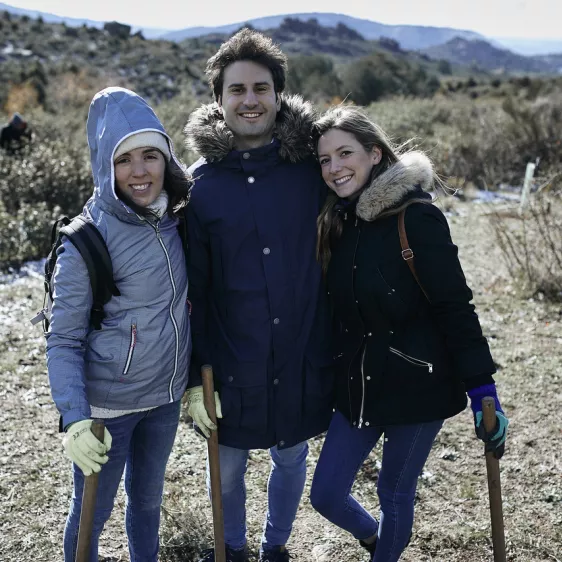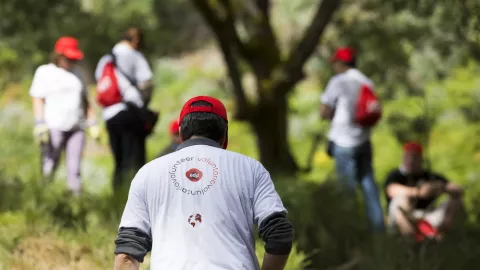At EDP, the Mind you Mind campaign was launched, with the aim of making our people aware of the importance of mental health. It was an opportunity to stop and for everyone to look at themselves, see how they are doing and think about their lives in the year to come. It is also a time to look around at colleagues and other people and learn from their examples. Gabriela Presente, from EDP Brazil, has agreed to introduce herself, tell her story, inspire and give her testimony to us all and, particularly, anyone experiencing anxiety and exhaustion.
"Our ambition as a company prepared for the future is only achievable if we prioritise individual well-being at work and everyone enjoys humane and meaningful experiences." These words are from EDP's CEO, Miguel Stilwell d'Andrade and are central to our well-being strategy. People are at the centre of our purpose and their well-being is a priority for us. We are focussed on promoting the five aspects of well-being: physical, social, emotional, financial and professional. No employee should neglect any of them.
The World Health Organisation (WHO) defines health not only as physical well-being, but also mental well-being: "Mental health is a state of mental well-being that enables people to cope with the stresses of life, realise their abilities, learn well and work well, and contribute to their community. It is an integral component of health and well-being that underpins our individual and collective abilities to make decisions, build relationships and shape the world we live in."
It is also a basic human right, according to the same organisation, and the theme of its mental health campaign in 2022 is precisely to make access to mental health a priority around the world.
The Mind Your Mind campaign serves to reflect together on this well-being, with a special focus on mental health and also invites all EDP employees to participate in talks, workshops and other initiatives where we explore these themes and encourage personal journeys. It was in this context that Gabriela Pesente volunteered to share her experience of reconciling family, motherhood, work, and personal care, in a Trust Space talk, which you can watch in full in the video.
"Companies know that they play a very large role in the lives of people. When we stop and think about the time that people spend at work... it is a very long time. A person spends more than half of their waking hours at the company. I believe responsibility has to be taken on this issue, at least for people to be well. And when we think of the 'least' that is required, think of having a healthy environment, a balanced environment, where a person feels well, where they are able to talk. I think that when we speak about mental health, we think a lot about trusting relationships," reflects Gabriela Presente. "Here at EDP, I have always been lucky to have managers I could talk to, but I have also had other people I could always talk to, such as in the health area, always available, work colleagues. So, I think that as a company, we have to be aware of how significant we are in the life of the individual and keep the doors open to give a person access. When I make myself vulnerable before another person, they know they can count on me," she said in the Trust Space talk.

Here at EDP, I have always been lucky to have managers I could talk to, but I have also had other people I could always talk to, such as in the health area, always available, work colleagues. So, I think that as a company, we have to be aware of how significant we are in the life of the individual and keep the doors open to give a person access. When I make myself vulnerable before another person, they know they can count on me,
Gabriela's story shows how speaking to someone who has also gone through emotional and work overload, and hearing about their experience, was decisive in helping her to act in relation to her own anxiety. And it was with this generosity of sharing on an issue that is often taboo, that she gave her testimony.
When the pandemic began, the idea of staying at home and closely following the growth of her daughter for around a year seemed idyllic to Gabriela Presente, people and efficiency management and planning consultant at EDP Brazil. But soon the idea that she had to do everything without asking for help intensified: she ended up having a tachycardia and realised that the state of anxiety in which she was living was abnormal and so she asked for help. "If we don't put ourselves in our schedule, nobody else will put us there," said Gabriela. Today, she speaks openly about this period and how she overcame it – and overcomes it every day – as an example for anyone finding themselves in the same situation.
Motherhood marked a change for Gabriela Presente and she decided to share her experience so that other women are able to recognise and address difficulties. "I always had the habit of turning things around. I always knew what was important to me and would solve things myself. When Julia arrived, there was another person to care for. I no longer had the time to dedicate to myself as before," she recalled.
"Motherhood is the two extremes: the most beautiful and most solitary thing. The greatest love and the greatest desolation. And I believed I had to take care of everything because my mother had taken care of everything," she said.
With the return to work, about a year after the birth of her daughter, the way she was neglecting some self-care habits, such as physical exercise, and the intensity with which she combined motherhood and work was underlined by the pandemic and by lockdown. Unable to take her to school, to go to the gym, to go to homeopathy or even spend the day outside, she said she felt like she was at a "dead end". "My PMT was crazy, totally out of control. The gynaecologist prescribed a prescription medicine, but I didn't take it because I didn't think I needed it."
She bought the medicine, but didn't take it. A year and much stress and anxiety later, came the time when she finally realised the situation was abnormal. "At the end of last year, I had moved to a different house, Julia was ill and a big work request arrived. I felt a tachycardia and almost snapped at the person making the request. I could see this was not normal. I was exhausted with relationships, as well."
Between that moment and when she began to prioritise her mental health, her colleagues performed an essential role. "I spoke with the EDP doctor and he told me, 'As a doctor, I cannot let you explode.' Days later, I spoke with my manager. He, aside from welcoming me, told me about personal experience, a time when he passed through something similar." It was after hearing this experience in the first person that made her, that same day, start to take the tablets she had been prescribed.
Feeling that the personal testimony of a colleague was so important, Gabriela Presente also wants to use her own example today, to break the taboo and inspire others in similar situations. "When they ask me to speak on this topic, I do it because I know that real stories like this are very important. I don't think I am very relaxed on camera, but I think that we have to speak up and I don't have a problem in exposing myself. It is very good for people to know about real life," she explained.
"After much reflection, my priorities became very clear to me: Julia, my daughter, was always my priority, but I was in second place. It was not other people, nor EDP, nor my family. It was Julia, me and then the rest. I needed to return to who I was," said Gabriela in the Trust Space talk.
Today, Gabriela knows that her mental well-being is the balance that takes effort to maintain, takes time, that she has to make herself a priority in her own schedule to do what makes her feel good – therapy, physical exercise, floral therapy, spending time with her daughter daily, homeopathy and piano lessons – her most recent hobby. "Taking up the piano is very emotional for me because all my life I heard my grandmother play the piano [she was a piano teacher]. After the piano lessons, I feel the world is much bigger... Whenever I finish a lesson, I feel animated and want to do more. It is so cool to start an instrument at 40 years old," she said.
"Self-care: people usually think it means bath with foam and roses, and we aren't able to do that in our daily lives, and, really, this is not what makes us feel good. It's the idea of knowing yourself. For me, sport is something that I like, which is very good because it stops my thoughts and I am present living in the moment," she explains.

Self-care: people usually think it means bath with foam and roses, and we aren't able to do that in our daily lives, and, really, this is not what does us good. It's the idea of knowing yourself. For me, sport is something that I like, which is very good because it stops my thoughts and I am in the moment.
Gabriela's message is also about how it is import important to decentralise work from the day and from life to be able to live it – and all its other aspects – in a healthier way. "I think it is very unfair that work has to occupy the most important space in our life. I think it is very important that we do other things that are good for us, as well, and set the tone for what is most important in our lives," said Gabriela in the Trust Space talk. She continues: "Work hasn't stopped being challenging, the quantity hasn't diminished – it's the same as ever – but perhaps what's changed is the calmness or the different relationship to it, not being so overwhelmed emotionally by it. I am very much bound by delivery, by commitments, which sometimes is suffocating. When you are able to do other things that are also important to you beyond work, it takes on a different proportion, and you start to feel calmer."
The testimony of Gabriela is that self-awareness is positive. "You have to know yourself, at least, to know what you like, what does you good. Everyone is different. There are people who will want to meditate, people who will run like I do. So, everyone is different. But this is something to respect, remembering that we aren't going to be successful with this 100% of the time. Don't delay in starting to care for yourself, look after yourself, respect yourself and think about something that would be great for you," she concluded.
But nobody is – and must never be – alone. Talking to people and finding support from someone else could be the first step: "Speak to someone when you need help. Here at EDP, we have a social support programme, so that if someone needs something, but doesn't feel able to talk with their manager or a friend, there is a way for us to talk to someone else. There are channels for asking for help. There is someone to talk to." Every step counts. Even the smallest.
Well-being and benefits
Our people are the priority
Because we want to ensure a positive and impactful experience for our people, guaranteering individual well-being is one of our top priorities. That is why we promote initiatives for everyone's happiness and growth.




